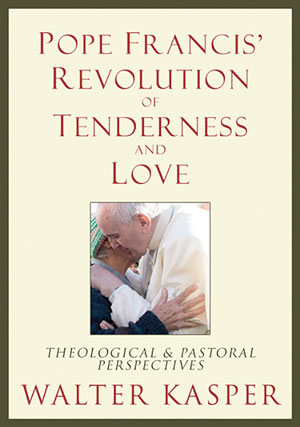Third in a series
 IN THE FIRST FEW months of his pontificate Pope Francis was depicted, at least in some reports, as though he was totally different from the popes who had preceded him. The impression was received by some that there was little connection between Francis and his predecessors. Of course this was a very wrong impression.
IN THE FIRST FEW months of his pontificate Pope Francis was depicted, at least in some reports, as though he was totally different from the popes who had preceded him. The impression was received by some that there was little connection between Francis and his predecessors. Of course this was a very wrong impression.
In his “Pope Francis’ Revolution of Tenderness and Love” (New York: Paulist Press, 2015, pp. 117, $16.95) Cardinal Walter Kasper, noting the different backgrounds of Pope Benedict and Pope Francis, writes the following:
“The difference between Pope Benedict and Pope Francis thus goes back far, but it does not concern theological truth. Rather, it concerns theological method and its concomitant emphases, as well as Pope Francis’ style, which is less didactic and more kerygmatic. With reference to the old as well as the more recent history of the papacy, such differences are nothing new, but rather are an expression of Catholic unity in diversity, as well as a sigh of a not defunct but living tradition that is guided by God’s Spirit. The entire history of the papacy is full of such unity in diversity and difference.” (p. 12)
Cardinal Kasper suggests that the method developed by the founder of the Young Christian Workers, Cardinal Joseph Cardijn (1881-1967), had a strong influence on Pope Francis before he became pope. The method of the Young Christian Workers was to observe, judge and act. When I read this in Cardinal Kasper’s book, many wonderful memories came back to me. When I was a young parish priest in the early 1960s, I was the chaplain for four Catholic Action movements: The Young Christian Workers, the Young Christian Students (college level), the Young Christian Students (high-school level) and the Christian Family Movement. All these movements used the method developed by Cardinal Cardijn: observe, judge, act.
I met regularly with these groups and they would focus in on some problem, usually in the parish, observe the situation, make a judgment about what could be done and then take action to try to correct the problem. These meetings were encouraging and inspiring for me. The enthusiasm and commitment of the participants encouraged me to be enthusiastic and committed.
The people involved in the Catholic Action groups took their faith seriously and wanted to bear witness to Christ in their daily lives. Looking back, I marvel at the impact that those Catholic Action groups had on me. I suspect that Pope Francis is using the method of observe, judge, act as he leads the Church.
Cardinal Kasper is very good at explaining just what the Church means by tradition, the tradition which Pope Francis is handing on in his teaching. The cardinal writes the following:
“Tradition is the content of the apostolic inheritance that is binding for all times, as well as realizated ever anew in the Holy Spirit. In this sense, tradition is understood by the Second Vatican Council as a living tradition, in which, with the aid of the Holy Spirit, there is progress and growth in the understanding of the apostolic faith that has been handed on once and for all…
“Pope Francis wants to clear away many of the accumulated ashes in order to bring to light anew the fiery nucleus of the gospel. If one wants to speak of a revolution, then it is not a revolution in the sense of a violent overthrow, but rather, as Francis says, the fervent revolution of tender love, upon whose transforming power from within he relies.” (p. 13)
I think that the expression “revolution of tender love” is beautiful and also provocative. What does it suggest? It suggests that we can not force people to believe nor should we want to force faith on people. Faith has to be a free act. Does that mean we do nothing? Of course not. The “revolution of tender love” suggests that we bear witness with our lives. If our lives bear witness to Christ, if it is obvious that Christ is the center of our lives, we will be tapping into divine power. The expression “revolution of tender love” suggests that we believe in the power of love, indeed that we believe that love is the most powerful force in the universe. Through the power of love even death has been conquered in Jesus’ resurrection.
I once thought that bearing witness with our lives was not doing very much. Now I believe there is nothing more important that we can do.
Father Robert Lauder, philosophy professor at St. John’s University, Jamaica, is the author of “Pope Francis’ Spirituality and Our Story” (Resurrection Press).
